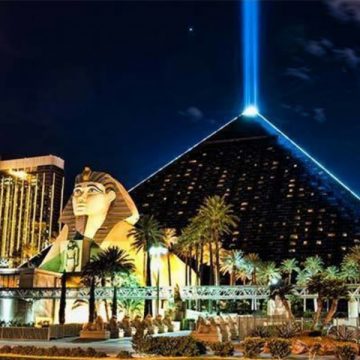
The Luxor is the latest Las Vegas Strip casino to close its poker room. The MGM Resorts-owned casino announced it would close its dedicated poker room on June 18.
Luxor’s closure marks the third Vegas Strip poker room to close this year. The Monte Carlo closed its card room in April 2017. Hard Rock Las Vegas closed its tiny poker room in March 2017.
Las Vegas Poker Room Closings
In all, twenty-two different Las Vegas-area poker rooms have closed over the past 6 and 1/2 years. That leaves about 3-dozen card rooms in the greater Las Vegas metropolitan area.
At the moment, 18 poker rooms operate on the Las Vegas Strip. Those rooms contain about 260 poker tables. At the height of the poker craze in the United States in early 2007, the Las Vegas Strip had 26 poker rooms and 372 tables.
The poker niche has hardly grown in the past year. In the 12 months prior to May 1, 2017, the Las Vegas poker rooms took in a little over $77 million in revenues. That represents almost 0% growth in the market. Such is the legacy of 10 years without online poker to spur growth among the younger generation of casino goers.
Reasons for the Decline of Poker
One reason for the decline in the popularity of poker over the past ten years is the imposition of the Unlawful Internet Gambling Enforcement Act in 2006, along with the Black Friday scandal of 2011. The UIGEA made the online and gambling version of a form of gambling illegal, if it the over-the-telephone-wire version was made illegal under the 1961 Wire Act.
From 2006 to late-2011, the US Justice Department considered online sports betting, poker sites, and casinos to be illegal under the UIGEA. The means of enforcement was not direct. Instead, federal officials threatened to punish companies which supported illegal online poker, such as payment processors and software developers. Most of the biggest online payment processors and software design companies left the US market, especially if those companies were publicly traded.
Online Poker Sites after UIGEA
That did not stop the largest operators in the US poker market. Instead, PokerStars, FullTilt Poker, and Absolute Poker continued to accept American poker players in an unregulated environment. Other multi-purpose sites like Bodog accepted US poker players. Because these companies often used proprietary software, they had more flexibility than most big-name online casinos, which licensed software from publicly-traded companies.
Still, PokerStars and its competitors had to become more flexible in the type of payment processors they used. This led to considerable trouble on April 15, 2011, when the Justice Department seized the domains of PokerStars, FTP, and Absolute Poker. Preet Bharara also unsealed indictments on executives from those companies. The way the online card rooms processed withdrawals played a large role in the Black Friday indictments.
When the Justice Department later that year said that online poker and online casinos were considered legal under the terms of the UIGEA, people hoped that would reverse the trends vis-a-vis online poker. Unfortunately, the DoJ ruling required individual US states to legalize and regulate online poker before card rooms could go back to business as usual. Except in Nevada, New Jersey, and Delaware, that has not happened. The massive fines from Black Friday combined with a certain anticipation of legalization and licensing under a regulated market has caused PokerStars to turn away signups from Americans since 2011, except in New Jersey.
Without the ability to play at PokerStars, 888poker, PartyPoker, or other major sites over the past several years, the popularity of poker in the United States has declined. A new generation of players does not learn to play online poker, then head to the live poker rooms in Las Vegas. As the popularity has waned, so has the viewership of televised poker, which only exacerbates the problem.
Las Vegas Casinos Offer Different Games
In contrast, Las Vegas casinos have sought new ways to draw in millennial-age customers. The various plans to lure millennials to the casinos includes skill-based gaming machines, virtual sports, eSports, electronic roulette and blackjack, and even virtual golf.
Meanwhile, managers have added more live baccarat tables, in an attempt to lure Asian-American mass market players and Asian high rollers. Baccarat is the most popular table game in Asia, which has had a large percentage of the world’s economic growth over the past few years.
Michael Lawton on Tribal Poker Rooms
Michael Lawton, the Nevada Gaming Control Board’s Senior Research Analyst, has a different theory for the decline of poker in Las Vegas. Mr. Lawton blames the proliferation of tribal casinos across the United States. Such tribal casinos have their own dedicated poker rooms, so players feel less need to plan a trip to Las Vegas to play cards.
Lawton said, “The proliferation of casinos across the United States has decreased the need for players to travel to Nevada to play poker. At this point the consensus is that traditional poker will not experience any significant growth without a national interactive component to support growth in traditional poker by introducing new players to the game.”
Whatever the main reason for the decline of poker’s popularity in Las Vegas casinos, the closing of poker rooms on the Strip is a trend. It is easy to overstate that trend, as the Las Vegas Strip still has nearly 300 poker tables. If a card player wants to find a game on the Vegas Strip, they have no problem doing so. But if the trend continues, that might not always be the case.















